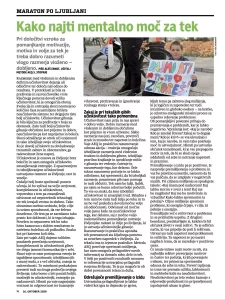
WHEN UNKNOWN PAIN APPEARS
Home » AEQ in media » WHEN UNKNOWN PAIN APPEARS
The source article can be found by pressing the button on the bottom of the screen.
The reason behind the painful movement is that it is too big of a disorder, not enough control over your body and lack of feeling, all of which the body warns us about.
And with that, we can see how wrong our attitude towards pain is. It’s the main result of reducing the importance of learning and the time we spend in life learning and research, which reduces the ability to lengthen muscles.
The coordination between contracting and expanding our muscles is greatly reduced when they are performing a certain movement. This eventually leads to increased disorder in movement, work, and with that, life. The disorder leads to inefficiency and has a greater influence on our mood and abilities.
What is our pain warning us about
We are first reminded of this by discomfort and resistance. If we do not regulate the condition, we feel pain more often, more strongly, and for a longer time. If we don’t know the actual reason and purpose of the pain, we try to defeat it, ignore it, or turn it off in multiple ways. In the short term, we also succeed in this, so we do not even discover any shortcomings and wrong logic regarding pain. We eventually get used to the pain, come to terms with it, and create the conditions needed to create chronic pain and the rigid muscles, connective tissue, joint and skeletal overload that follows. Rigidity makes movement more difficult, less enjoyable, and lowers the quality of life. From the above, we can understand that pain is essential to alert us to the entropy and disorder around us. Not understanding this function allows the development of technology, medicine, and pharmacy, which relieves our pain; to find the right reason for them, most of the time, we don’t even bother. The pain function is comparable to a warning light on a car armature.
It alerts us to a systemic mess and thus directs our attention to fix the problem – ourselves or seek an expert’s help. But while we understand the function of a warning light in a car, because we know that ignoring or consoling that the problem will go away on its leads to increasing disorder and clutter with increasingly costly consequences, we often do not recognize warnings. In the past, people have had a completely different attitude towards pain due to their different lifestyles. They knew that kneeling to disorder to which man is warned about leads to harder survival. When there were no hospitals, pharmacies, retirement, and paid leave due to the inability to work, order, conscientiousness, and a respectful attitude towards one’s body were not only needed but were instead necessary.
Our body is our temple
A temple that needs to be clean and tidy. If that is not the case, we show a bad attitude towards ourselves, and our well-being reflects that. Pain is a remarkable tool for warning ourselves and is also a warning against the even greater clutter that follows if a person does not take action. A better quality of life demands a certain amount of effort, perseverance, and learning. Exploring allows a person to maintain himself and his surroundings easily. Modern people have “thick skin.” They are less sensitive to others, to the effects of strong environmental stimulants (advertising, media, trade, noise), and themselves. Skin can be described as the outer boundary of the personality, which is exaggerated in more and more people, creating a solid wall that serves as a defense against the world, while isolating the individual from himself and his sensual work. In such a person, this wall becomes a strong mask withstands strong pressure while maintaining an upright posture and a smile on his face despite sometimes crazy attitudes towards time, energy, and surroundings.
Such personality in a crazy, modern world is successful and most accustomed to it. Such conditions cannot be maintained for a longer period without suffering from increased amounts of pain and illnesses of modern times due to the aforementioned physical laws. Thus, a person with a strong, active, working, positive, overly moody, but shallow and dependent personality, sooner or later kneels under stress and pressure and slips into burnout, chronic fatigue, depression, autoimmune diseases, and dementia. Such a person has an unenergized, starved skin, weak, and fragile boundary, making it vulnerable to being overwhelmed by its surroundings. Its way of defending itself is hiding from the world and withdrawing into loneliness or the virtual world of social media and a psychotic attitude towards the outside. To sum up this aspect of the impact of the environment on life, a person gets into serious trouble if he is overstimulated but not equipped to effectively direct excess energy, which is a reaction to an unrealistic attitude towards the environment to influence the environment less tense and stressful by creating different relationships that would respect his real physical abilities and the cyclical need for peace and low external pressure, which alone allows for a parasympathetic state even when we are not severely tired. The first law of thermodynamics says that energy cannot be created or destroyed. Even the amount of energy lost in the balance change cannot be bigger than the energy we gained, which means that our inner reaction to our surroundings, regardless of the ego’s denial, has to be expressed one way or the other. Suppose the energy isn’t expressed appropriately or efficiently through movement and influencing our surroundings by expressing active feelings (anger, love, joy). In that case, it remains trapped inside, causing instability, asymmetry, and an inefficient system. This then leads to entropy that the system needs to warn us about by using a strong enough impulse that we interpret as pain and make the ego realize that we need a state change.
When ego kidnaps the body
These warnings are perceived by the consciousness as pain or discomfort, due to intense pressure to regulate the state by the body, which cannot relativize reality, as consciousness can do in poor contact with the body. When such tension reaches a point where the person can’t take it anymore, the modern human deadens himself and develops a thicker skin, anxiety and increases the sympathetic way of the autonomous nervous system’s functioning. He is seeking ways to express this energy through accepted ways (adrenaline addiction, excessive sports, sexual addiction, …), or he distorts his breathing and food digestion to lower the amount and value of life energy and thus reduce the excess energy in the body.
Such an effect is also achieved through getting high (drug abuse, power, money, fame) or tiring ourselves out (workaholic, excessive sports, or entering tiring relationships, where the person allows to be taken advantage of and abused). The ego uses the constricted body against the perception of stimuli by raising the transverse striated muscles’ tone to distort and block its perception of internal torment. The larger the danger of pain penetrating through the armor, the more energy the ego uses to maintain the façade put up for the world to see, which becomes a way of controlling and rejecting oneself. The final effect of increasing overload and inefficiency is to shut down the true feeling self. It creates strong sensory-motor amnesia and prevents the body from its intelligence, intuition, and depth of perception of the surroundings and interior to influence the ego’s thoughts, awareness, and decisions, which directs the body’s actions the person as a whole and defines its present, with that also the future.
(Self)help? Exercises
When learning AEQ exercises, you will often encounter pain that students feel during or after the exercises. Pain always points to a disorder in movement; at the same time, this disorder causes pain in somatic movement. Therefore, the painful movement lacks order, control, and poor sensitivity, which the body warns us all about. At the same time, we can begin to understand how wrong our attitude toward pain is. And if we don’t change it, the warning will only pile on because the body doesn’t have any other choice. And in the end, the situation worsens so hard that the body stops us regardless of our ego’s strengths.
The ego wins the battles, and the body wins the war. If there is too little connection between them and the difference between the subconscious and the consciousness, it is too great.




